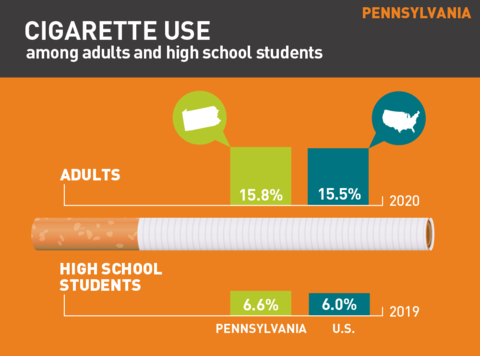Prices that are marked up by a certain amount may not be taxed, but buyers still feel like they are. A clause added at the last minute to Pennsylvania bill HB 1300 would raise the minimum markup on cigarettes sold in the state.
Tax stampers, wholesalers, and sellers would have to raise their prices because of the bill. When people pay more for something because of a tax, the extra money they get goes to the government. But when sellers mark up the price, they get to keep the extra money as profit.
According to HB 1300, the price markups must go up slowly every year until 2027. Taking into account the current prices, the suggested markups would cause the retail price to rise by about 8.5%, from $9.94 per pack to $10.79 per pack. Less legal sales would happen because of the price rise, which would mean less tax money coming in every year ($47 million less).
About 17% of Pennsylvania's cigarette tax money is set aside for special uses. Social services, like the Community and Economic Develop program and the Children's Health Fund, will lose the most direct funding from the drop in cigarette tax income. This is followed by a capital projects fund for farmland preservation.

When people shop across borders, they lose more money than usual. Pennsylvania currently loses about 7% of its total cigarette sales because people in the state buy cigarettes in nearby states with lower taxes. This bill about markups could make the black market in the state more than twice as big.
Minimum markup rules are not just for cigarettes or Pennsylvania. In a number of countries, alcohol and tobacco goods are subject to minimum markups. Gas prices in Wisconsin are raised by a certain amount. There are already minimum price laws for cigarettes in many states, but they tend to set a price floor that makes it illegal to sell cigarettes for less than a certain amount. Pennsylvania's plan, on the other hand, calls for a big jump in retail prices. The Pennsylvania Liquor Control Board also acts like a monopoly, which means it can raise prices, cut sales, and limit the number of places where people can buy goods by about 40 percent. This is not technically a minimum markup.
The Pennsylvania plan aims to stop people from smoking by making it more expensive to do so. However, the history of tobacco price minimums is one of protectionism, with smaller tobacco stores fearing that larger stores would use higher cigarette prices as "loss leaders" to get people to buy other things. They were policies that hurt consumers and were meant to shield certain businesses from competition, not to keep people from smoking. The goal may be different now, but plans don't always lead to results. Price increases may be meant to make people less likely to smoke, but they could just make it more expensive for users with lower incomes or cause sales to cross state lines.
People who pay taxes and people who make policy both generally hate minimum markup policies. Customers don't like higher prices. The policy does not bring in any extra money for the government, and minimum price policies almost always bring in less money because they lead to fewer sales. Legislators should think carefully about whether minimum markup rules are good for the people they represent.

















